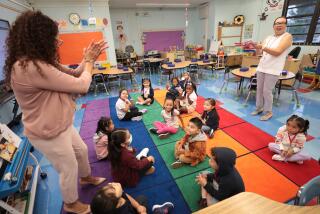Editorial: Finally, the anti-vaccine movement is losing steam
For the first time in years, there has been a slight uptick in the number of kindergartners who started the school year with all their recommended vaccinations, the state reported Tuesday. This is good news for California, where the anti-vaccine movement has thrived over the last decade despite its basis in a thoroughly discredited study and public statements by a few celebrities who are neither scientists nor medical experts.
The increase is significant not because it is big, but because it happened at all. After five years of falling immunization rates, the percentage of fully vaccinated kindergartners rose this year from 90.2% to 90.4%, the state Department of Public Health reported.
Some of the increase may be the result of a law that took effect this year requiring most parents to receive information about vaccination from a health professional before they can exercise a “personal belief exemption,” which allows them to keep their children from being vaccinated simply because they don’t like the inoculations. The law is hardly tough on disbelievers: Parents are still free to exempt their children after they’ve become better informed, and they can avoid even receiving the information if they claim that their religious beliefs run counter to vaccination.
The number of personal-belief exemptions had been rising steadily until this year when it fell significantly, to 2.5% of parents from 3.2%. But it’s not simply the new law at work. Kindergartners in both public and private schools were more likely to be vaccinated this fall, but the percentage increased more in private schools, where parents aren’t subject to the law.
Perhaps as the topic gains attention, the public is learning more about just how unsound and unscientific the anti-vaccine rhetoric is. Or perhaps recent outbreaks of whooping cough and measles have grabbed some parents’ attention. The measles outbreak earlier this year was the largest since 1996, and many of those who fell ill had intentionally not been vaccinated.
That might be their own business if it weren’t for the fact that the diseases can be spread to people who were vaccinated but did not receive full immunity and to those few who have valid medical reasons for not being vaccinated. Vaccinations are not 100% effective, and their success relies on having almost everyone participate. Vaccination rates in many schools are well below the levels needed for this so-called “herd immunity.”
The Department of Public Health should use the new data to craft policies that might turn this blip into a health trend. This is a health issue where the welfare of the many should take precedence over the unfounded fears of the few.
Follow the Opinion section on Twitter @latimesopinion
More to Read
A cure for the common opinion
Get thought-provoking perspectives with our weekly newsletter.
You may occasionally receive promotional content from the Los Angeles Times.










